Published
- 17 min read
Cloudways Alternatives Every Business Should Consider (2025)

Introduction
While Cloudways has been popular for simplifying managed hosting, many teams find its rising costs, WordPress-focused stack, and scaling limitations restrictive as they grow.
Cloudways alternatives are becoming an important consideration for businesses that want more control, predictable pricing, and flexibility in their cloud hosting.
In 2025, the market offers a range of alternatives that deliver better performance, transparent pricing, and features tailored to startups, agencies, and enterprises.
Some providers stand out for global infrastructure reach, while others win on ease of deployment or developer-friendly tools.
This guide breaks down the best Cloudways alternatives for businesses of all sizes, from startups to agencies and enterprises. We’ll also show you why many are switching to Kuberns, an AI-powered platform that combines the ease of managed hosting with the cost efficiency of raw IaaS.
By the end of this article, you’ll have a clear understanding of which alternative fits your business needs and how to make the transition seamlessly.
Why Look Beyond Cloudways in 2025?
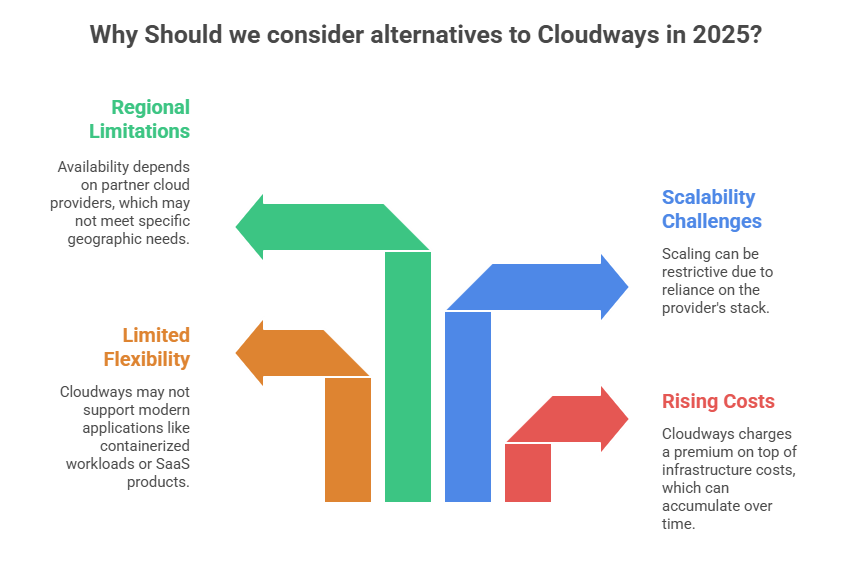 Cloudways is a solid choice for teams that want managed hosting without touching raw infrastructure, but it isn’t always the best fit for growing businesses. As companies expand, their priorities shift from basic management to cost efficiency, scalability, and flexibility. That’s where Cloudways often falls short.
Cloudways is a solid choice for teams that want managed hosting without touching raw infrastructure, but it isn’t always the best fit for growing businesses. As companies expand, their priorities shift from basic management to cost efficiency, scalability, and flexibility. That’s where Cloudways often falls short.
1. Rising Costs with Managed Services
Cloudways charges a premium on top of providers like AWS, DigitalOcean, and Vultr. This means you’re paying extra for management while still dealing with the underlying costs of the original infrastructure. Over time, this can add up to thousands of dollars a year. Platforms like Kuberns, which help businesses cut up to 40% of AWS costs, give you cost savings without the management overhead.
2. Limited Flexibility for Modern Apps
While Cloudways is popular among WordPress users, it’s less suited for businesses running containerised workloads, SaaS products, or custom applications.
Teams looking for flexibility often move toward IaaS providers or developer-friendly platforms. Our detailed guides on OVH alternatives and Hetzner competitors highlight how infrastructure-first providers deliver this flexibility at scale.
3. Scalability Challenges
Scaling on Cloudways can feel restrictive because you’re tied to the provider’s stack.
Businesses with rapid growth, especially startups and SaaS products, often require seamless scaling options, advanced monitoring, and automation. This is where Kuberns’ AI-powered deployments stand out, offering autoscaling, built-in monitoring, and zero DevOps complexity.
4. Regional and Data Centre Limitations
Cloudways’ availability depends on the cloud providers it partners with. If your business needs low-latency hosting in specific geographies, you may find better coverage and pricing with alternatives like Vultr or Kamatera.
In short, Cloudways is convenient but not always cost-effective or flexible enough for modern businesses. That’s why exploring alternatives has become essential in 2025.
What to Look for in a Cloudways Alternative?
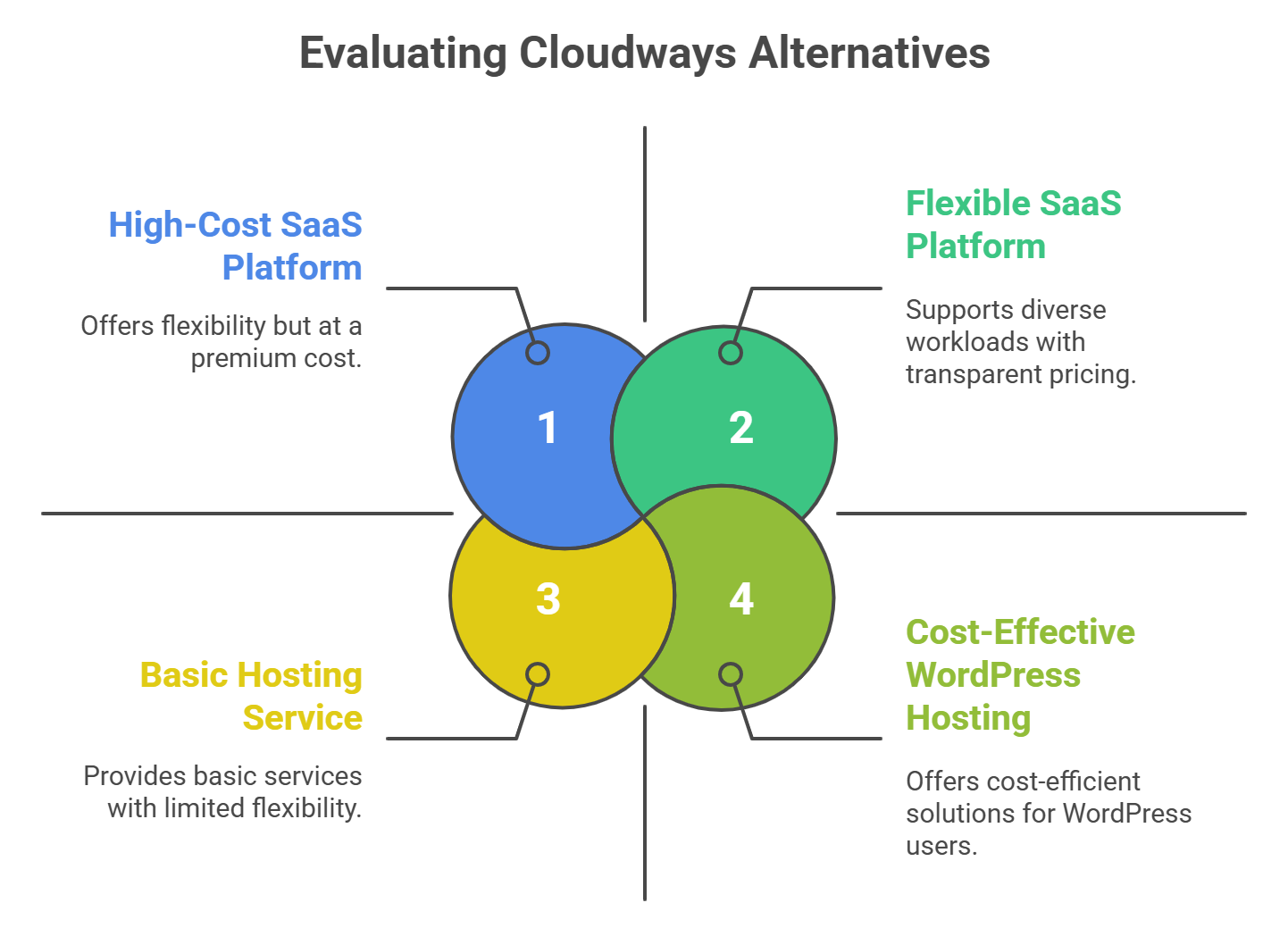
Not every hosting provider can replace Cloudways effectively.
The right choice depends on your business goals, technical requirements, and growth stage. Here are the key factors you should evaluate when considering Cloudways alternatives in 2025:
1. Cost Efficiency and Transparent Pricing
One of the biggest frustrations with Cloudways is paying for both the underlying infrastructure and their management layer.
Over time, these double charges add up, making it hard for startups and SMBs to keep costs under control. A strong alternative should offer clear, upfront pricing where you know exactly what you’ll spend each month, no surprise add-ons for bandwidth, backups, or scaling.
2. Ease of Deployment for Teams Without DevOps
Not every business has an in-house DevOps team. A good alternative should allow smooth onboarding and deployment without technical hurdles. Look for features like one-click environments, Git-based workflows, and automated scaling that let teams deploy quickly and focus on product development rather than infrastructure.
3. Global Infrastructure and Performance
If your customers are spread across regions, latency matters. Cloudways relies on its partner providers for regions, which can sometimes limit choice. When considering alternatives, check data centre availability and regional performance.
4. Flexibility for Modern Workloads
Cloudways works well if you’re running WordPress or a simple PHP application, but businesses building SaaS products, APIs, or containerised applications often hit limitations.
A flexible alternative should support a wide variety of workloads, from web apps and microservices to modern CI/CD pipelines. This ensures you won’t need to migrate again once your technical needs evolve.
5. Developer-Friendly Tools and Automation
Developers today don’t want to juggle multiple tools for builds, testing, and monitoring. Alternatives that integrate CI/CD pipelines, logging, and performance dashboards can save weeks of engineering time each year.
Features like CI/CD pipelines, monitoring, and autoscaling can save significant time and reduce tool sprawl. Platforms that integrate these natively are better suited for fast-moving teams.
6. Support and Reliability
Cloudways has limited support tiers, and businesses often need more than ticket-based help when scaling mission-critical apps.
An ideal alternative should offer responsive, multi-channel support and clear SLAs. Pay attention not only to how quickly providers respond but also to how well they help you resolve issues during scaling or migrations.
When you compare alternatives against these factors, you’ll notice some providers are optimised for affordability, others for flexibility, and some for speed of deployment. The key is finding the balance that matches your current stage while preparing you for the future.
These Are The Top Cloudways Alternatives in 2025
If you’re considering moving away from Cloudways, you’ll find no shortage of providers in the market.
But not all of them are suitable replacements, especially if your business is looking for a balance between cost, performance, and ease of use.
Below are the top Cloudways alternatives every business should evaluate in 2025.
1. Kuberns (All In One AI-Powered Platform)
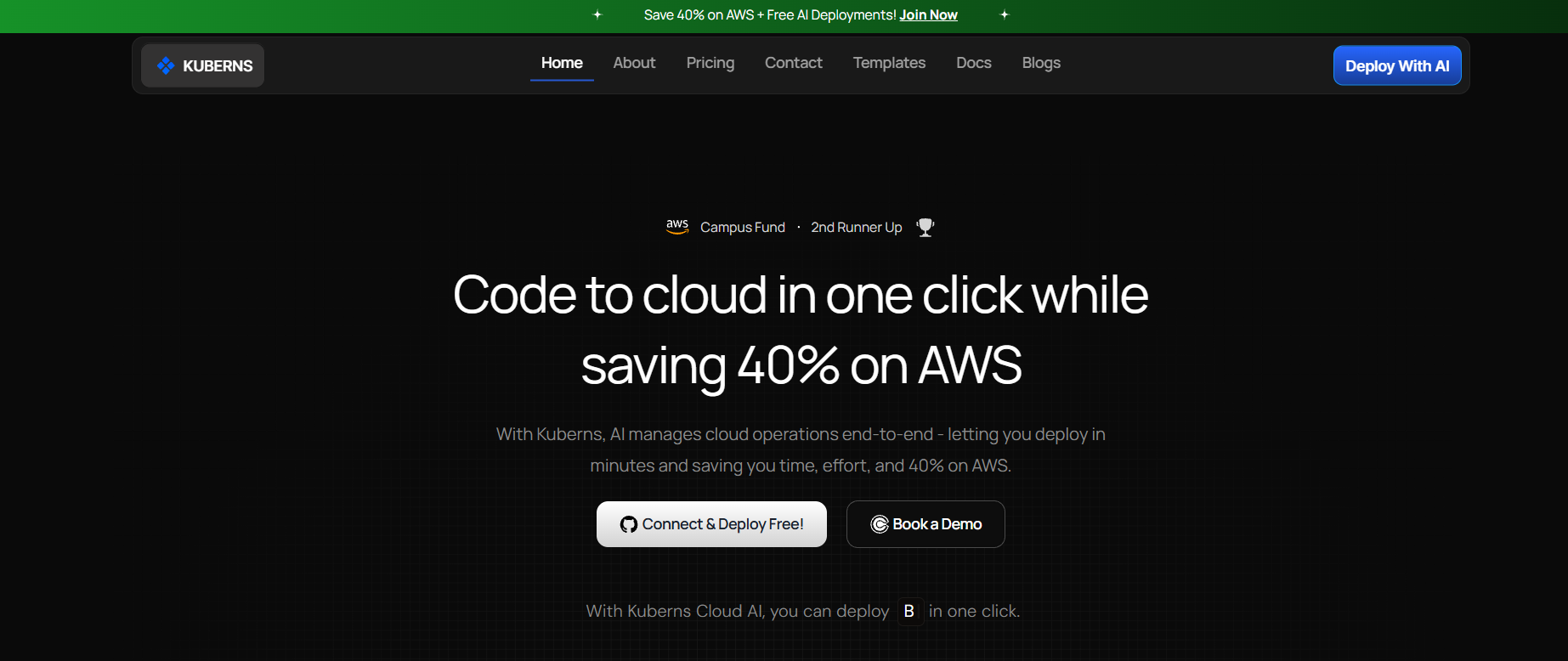 Kuberns is not just another cloud provider. It’s an AI-powered deployment platform that removes the complexity of managing infrastructure while cutting costs.
Kuberns is not just another cloud provider. It’s an AI-powered deployment platform that removes the complexity of managing infrastructure while cutting costs.
Instead of layering management fees on top of AWS, Kuberns hosts directly on AWS-backed infrastructure and optimises usage with AI. This results in up to 40% cost savings compared to traditional setups.
Unlike Cloudways, which is primarily designed for WordPress and PHP apps, Kuberns is built for modern businesses: SaaS products, APIs, containerised apps, and agencies handling multiple projects.
Features like one-click deployments, Git integration, autoscaling, monitoring, and logs come out of the box. That means your team doesn’t need a dedicated DevOps engineer to manage deployments.
- Pros: AI-driven optimisation, saves 40% on AWS, global reach, one-click deployments, built-in monitoring.
- Cons: Newer compared to legacy players, still expanding ecosystem.
- Best For: Startups, agencies, and SaaS businesses that need predictable costs and seamless scaling.
Learn more: What is Kuberns? A simpler way to deploy and scale apps
2. Hetzner
 Hetzner is one of Europe’s most established cloud providers, well known for its affordable pricing and bare-metal servers. Many businesses pick Hetzner when they want low-cost infrastructure without sacrificing reliability.
Hetzner is one of Europe’s most established cloud providers, well known for its affordable pricing and bare-metal servers. Many businesses pick Hetzner when they want low-cost infrastructure without sacrificing reliability.
For companies with EU-based customers, Hetzner is often the first choice due to strict data protection and GDPR compliance.
However, Hetzner’s strength in affordability comes with trade-offs.
It has fewer global data centres than Vultr or AWS, and support options can feel limited. Still, it remains one of the most attractive choices for developers and SMBs targeting European markets.
- Pros: Extremely cost-effective, GDPR-compliant, reliable infrastructure.
- Cons: Limited global reach, less responsive support.
- Best For: European businesses or startups on a tight budget.
Related: Discover the best Hetzner alternative options today
3. Vultr
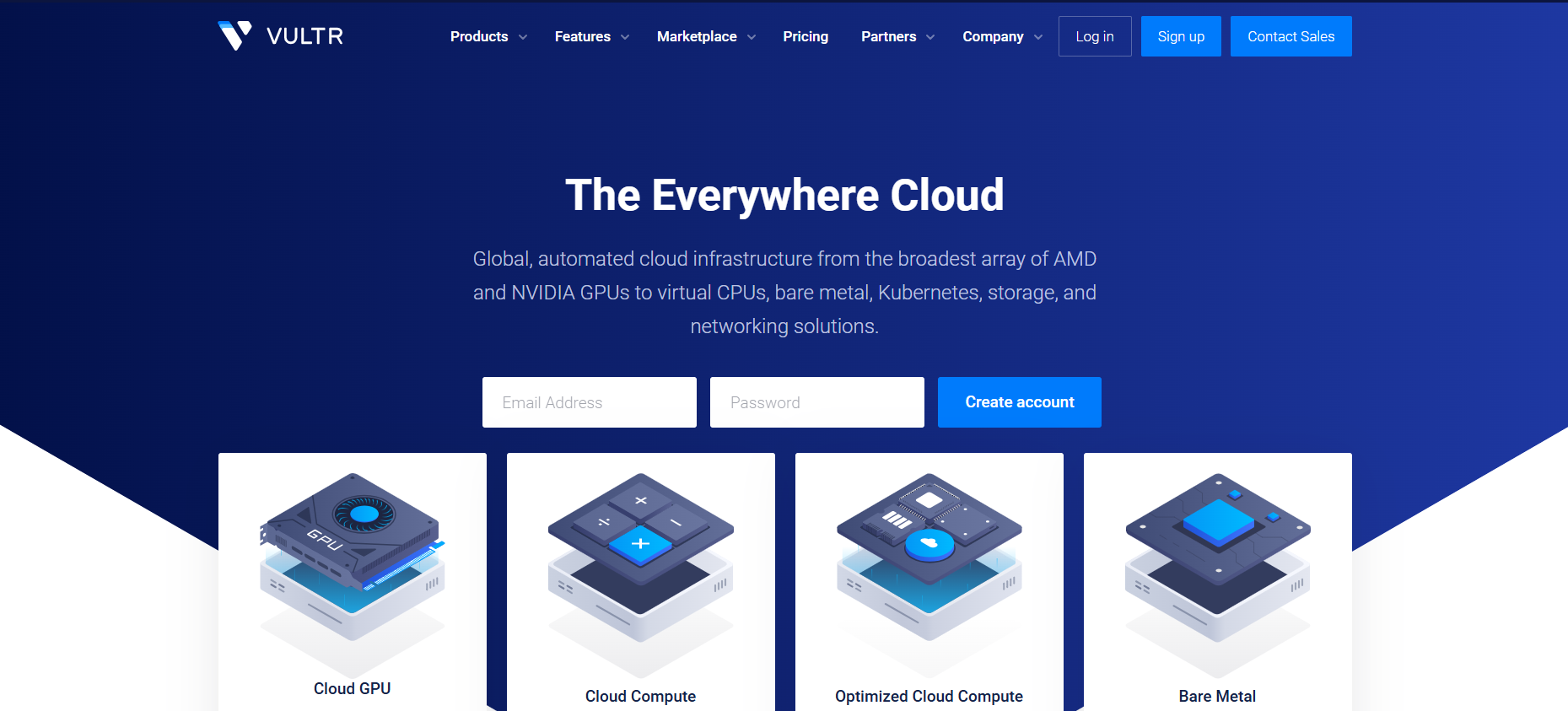 Vultr has built its reputation around a global footprint, with data centres spread across North America, Europe, Asia, and beyond. It’s particularly popular with developers who want to deploy applications quickly in different regions.
Vultr has built its reputation around a global footprint, with data centres spread across North America, Europe, Asia, and beyond. It’s particularly popular with developers who want to deploy applications quickly in different regions.
Compared to Cloudways, Vultr provides more direct access to infrastructure, letting you configure instances with greater flexibility. But costs can climb once you add bandwidth, backups, or premium storage. It’s still a go-to for developers needing speed and worldwide coverage.
- Pros: Global data centre coverage, developer-friendly, easy to provision.
- Cons: Pricing can escalate with usage, limited managed features.
- Best For: Developers and businesses needing low-latency deployments across regions.
Related: Best Vultr alternatives
4. OVHcloud
 As one of Europe’s largest hosting companies, OVHcloud is a strong competitor in the IaaS space. It offers a wide portfolio: VPS, dedicated servers, and enterprise-grade cloud solutions. Businesses often turn to OVH when they want reliable infrastructure combined with competitive pricing.
As one of Europe’s largest hosting companies, OVHcloud is a strong competitor in the IaaS space. It offers a wide portfolio: VPS, dedicated servers, and enterprise-grade cloud solutions. Businesses often turn to OVH when they want reliable infrastructure combined with competitive pricing.
That said, OVHcloud has a reputation for complexity. Its platform isn’t always beginner-friendly, and support can sometimes lag behind competitors. Enterprises with compliance or sovereignty needs in Europe still find OVHcloud a natural fit.
- Pros: Wide range of services, EU compliance, strong dedicated server options.
- Cons: Steeper learning curve, slower support response.
- Best For: Enterprises and EU businesses requiring compliance and scalability.
Related: Best OVH alternatives
5. Kamatera
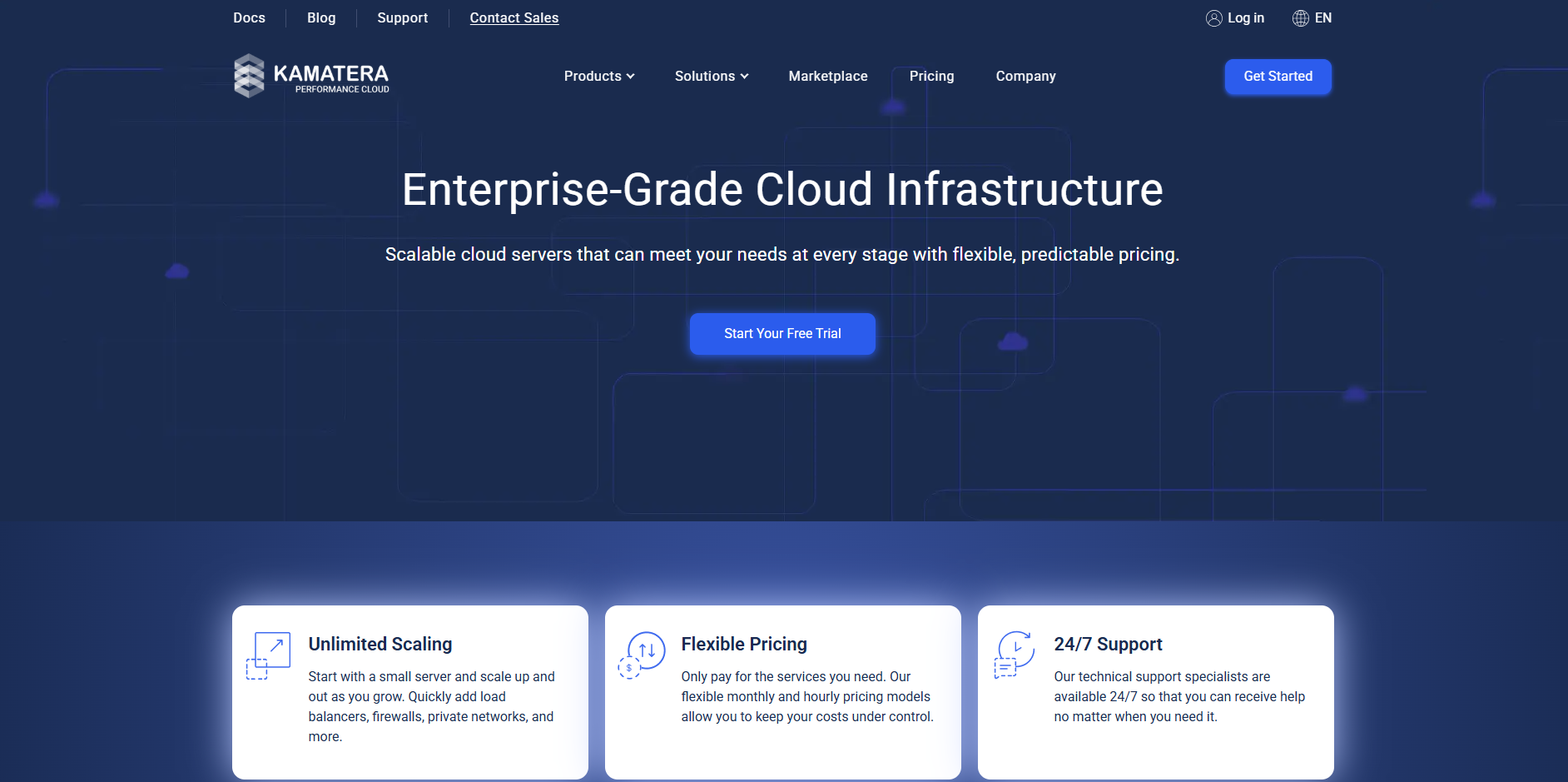 Kamatera is all about flexibility. It gives businesses the ability to configure servers down to fine details, from CPU cores and RAM to storage and networking. This makes it appealing for companies with specific requirements that don’t fit neatly into pre-packaged plans.
Kamatera is all about flexibility. It gives businesses the ability to configure servers down to fine details, from CPU cores and RAM to storage and networking. This makes it appealing for companies with specific requirements that don’t fit neatly into pre-packaged plans.
The downside is that customisation brings complexity. Kamatera is not as beginner-friendly as Cloudways, so businesses without technical expertise may find it challenging. Still, for IT teams that want control, Kamatera is one of the strongest options.
- Pros: Highly customizable, global coverage, scalable resources.
- Cons: Steep learning curve, requires technical know-how.
- Best For: Businesses with unique infrastructure needs or complex deployments.
Related: Top Kamatera alternatives
6. DigitalOcean
 DigitalOcean has long been a favourite among startups and small businesses for its simplicity and predictable pricing. Its “droplets” make it easy to get applications up and running without navigating overly complex dashboards.
DigitalOcean has long been a favourite among startups and small businesses for its simplicity and predictable pricing. Its “droplets” make it easy to get applications up and running without navigating overly complex dashboards.
Compared to Cloudways, DigitalOcean gives you more direct control while keeping the interface user-friendly. But as your apps grow, you may find that add-ons like storage, bandwidth, and monitoring increase overall costs.
- Pros: Simple UI, great documentation, predictable monthly pricing.
- Cons: Not as feature-rich for enterprises, and costs can rise with add-ons.
- Best For: Startups and SMBs that want a straightforward hosting experience.
Related: DigitalOcean Alternatives
7. Linode (by Akamai)
 Linode has been serving developers for years with reliable and affordable hosting. Since being acquired by Akamai, it has expanded to include more edge computing and enterprise features, making it more competitive in 2025.
Linode has been serving developers for years with reliable and affordable hosting. Since being acquired by Akamai, it has expanded to include more edge computing and enterprise features, making it more competitive in 2025.
While Linode remains developer-focused, some businesses are watching closely to see how Akamai’s influence reshapes its offerings. For teams that value stability and strong support, Linode remains a solid Cloudways alternative.
- Pros: Reliable infrastructure, strong developer community, and improving enterprise focus.
- Cons: Transition under Akamai is still in progress, fewer advanced integrations than AWS.
- Best For: Developers and businesses looking for affordable, dependable hosting.
Cloudways vs Alternatives: Comparison Table
When evaluating Cloudways alternatives, it helps to see how they compare side by side.
Below is an overview of pricing, ease of use, global reach, and the type of business each platform best serves.
| Provider | Pricing Model | Ease of Use | Global Reach | Best For |
|---|---|---|---|---|
| Kuberns | Transparent, up to 40% AWS savings | 1-click deployments, no DevOps | Global AWS-backed infra | Startups, agencies, SaaS products |
| Cloudways | Premium over base providers | Beginner-friendly | Depends on partner infra (AWS, DO, Vultr) | WordPress users, small business sites |
| Hetzner | Very low-cost, EU-focused | Moderate | Strong in Europe, limited globally | Budget-conscious EU businesses |
| Vultr | Pay-as-you-go, bandwidth extra | Developer-friendly | Global coverage | Developers needing regional flexibility |
| OVHcloud | Competitive, wide range | Less beginner-friendly | Strong EU, global footprint | Enterprises needing compliance |
| Kamatera | Fully customizable | Complex for beginners | Global coverage | Businesses with custom infra needs |
| DigitalOcean | Predictable monthly pricing | Very easy | Global presence | Startups and SMBs |
| Linode (Akamai) | Affordable plans, edge focus | Developer-friendly | Expanding with Akamai | Developers and small teams |
This table makes it clear:
- Cloudways is great for beginners, but charges a premium.
- IaaS-first providers like Hetzner and OVHcloud excel in cost and compliance.
- Platforms like Vultr and Kamatera offer global reach and flexibility.
- Kuberns stands out by combining ease of use with cost savings, making it a natural upgrade for businesses scaling beyond Cloudways.
Why Kuberns is the Smarter Cloudways Alternative?
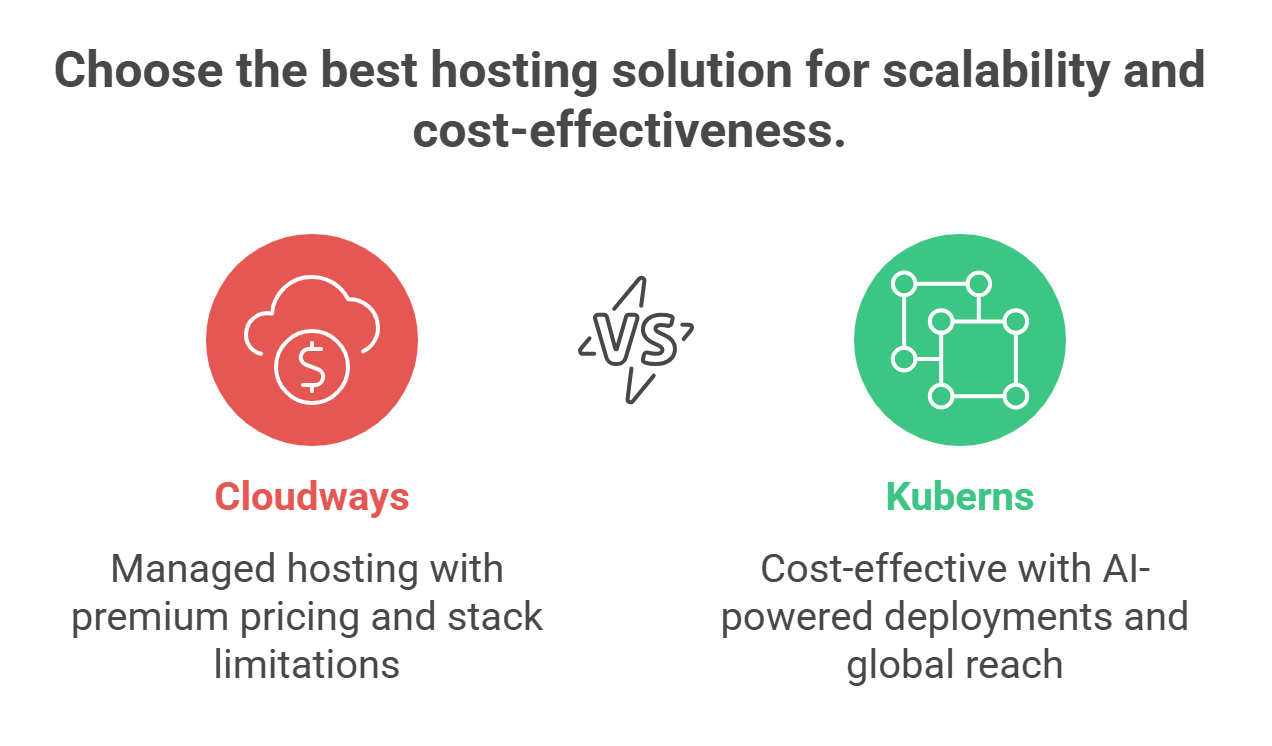 Cloudways has been a go-to for teams that want managed hosting, but as businesses scale, its premium pricing and stack limitations often become barriers.
Cloudways has been a go-to for teams that want managed hosting, but as businesses scale, its premium pricing and stack limitations often become barriers.
That’s where Kuberns takes a different approach, combining the simplicity of managed hosting with the flexibility and cost efficiency of raw infrastructure.
Here’s why more businesses in 2025 are choosing Kuberns as their Cloudways alternative:
1. Significant Cost Savings
While Cloudways adds a management layer on top of AWS, Vultr, or DigitalOcean, Kuberns hosts apps directly on AWS-backed infrastructure and optimises usage with AI. The result? Up to 40% savings on AWS costs, passed directly to you.
2. Zero DevOps Overhead
Cloudways simplifies hosting but still leaves you tied to predefined stacks and manual scaling. Kuberns eliminates these pain points with AI-powered deployments, autoscaling, and built-in monitoring, so your team doesn’t need to hire DevOps specialists.
3. Global Reach with AWS Infrastructure
Your apps are hosted on AWS data centres worldwide, ensuring low latency and reliability for global audiences, a key advantage over regional providers like Hetzner or OVH.
4. Everything in One Platform
Instead of juggling separate tools for CI/CD, monitoring, logs, and SSL, Kuberns gives you an all-in-one deployment platform. This means faster delivery cycles, fewer tools to manage, and better visibility across your applications.
5. Simple, Transparent Pricing
Unlike Cloudways’ layered model, Kuberns offers clear, predictable pricing that scales with your needs. Businesses know exactly what they’re paying, without surprise add-ons.
Which Cloudways Alternative Fits Your Business?
Not every business has the same hosting priorities. Some want affordability, others demand flexibility, while many simply want a platform that’s easy to manage without a DevOps team.
Here’s how to decide which Cloudways alternative is the best fit for your situation:
For Startups and Growing Businesses
Startups often struggle with balancing performance and costs. Cloudways can get expensive as usage scales, making it less ideal in the long run. Affordable providers like Hetzner are attractive for EU-based startups, while appealing to smaller teams looking for predictable monthly pricing.
But if you want cost savings plus simplicity, Kuberns offers up to 40% AWS savings and lets you deploy from code to cloud in just a few clicks, no DevOps overhead.
For Agencies Managing Multiple Clients
Agencies need a platform that’s easy to manage across different projects while staying cost-efficient. Cloudways does provide convenience, but its pricing and limited customisation can be restrictive.
Kuberns is also a strong option here, as it simplifies client deployments with one dashboard and provides built-in monitoring and logs.
Alternatives like Vultr and Kamatera also give agencies flexibility in choosing server locations and configurations.
For Enterprises and Large Teams
Enterprises often require compliance, scalability, and multi-region deployments. OVHcloud and Hetzner are both strong in the EU market with their compliance standards, while Linode (now under Akamai) is gaining traction with enterprise edge solutions.
However, enterprises that want the flexibility of AWS without the full cost can look at Kuberns, which runs hosts on AWS-backed infrastructure but reduces costs with AI optimisation.
For Developers and Technical Teams
Developers who enjoy control and want to configure environments to their liking often lean toward Vultr, Linode, or Kamatera. These platforms allow granular customisation that Cloudways doesn’t provide. But developers who prefer to focus on code rather than infrastructure may find Kuberns appealing, since it integrates CI/CD pipelines, monitoring, and autoscaling into the platform by default.
Ready to Move Beyond Cloudways?
If you’ve outgrown Cloudways or want a hosting solution that scales with your business, it’s the right time to explore smarter options.
With Kuberns, you get the best of both worlds. The ease of managed hosting and the flexibility of cloud infrastructure, all while saving up to 40% on AWS costs.
Whether you’re a startup trying to keep expenses predictable, an agency managing multiple client projects, or an enterprise that needs global reach, Kuberns helps you deploy and scale applications without DevOps hassle.
👉 Start deploying with Kuberns today and experience stress-free cloud hosting built for businesses like yours.

Frequently Asked Questions
Is Cloudways good for all businesses?
Cloudways works well for WordPress users and small projects, but growing businesses often find its costs and limitations restrictive. For startups, agencies, and enterprises, alternatives with better pricing and flexibility, such as Kuberns or direct IaaS providers, are usually a better fit.
Why should I consider a Cloudways alternative?
The main reasons businesses look for Cloudways alternatives are pricing, scalability, and flexibility. Cloudways charges a premium over providers like AWS or DigitalOcean and locks you into a limited stack. Alternatives give you more control, cost savings, and options for modern workloads.
Which is the best Cloudways alternative for startups?
Startups often need simple pricing and fast deployment. Platforms like DigitalOcean are beginner-friendly, while Kuberns is ideal if you want cost efficiency and automation without hiring a DevOps team.
Can I migrate easily from Cloudways to another provider?
Yes. Most Cloudways alternatives provide migration tools or support teams to assist with the process. With Kuberns, migration is straightforward. You can connect your code repository and deploy in a few clicks.
How does Kuberns pricing compare to Cloudways?
Cloudways adds a management layer fee on top of base infrastructure. Kuberns, on the other hand, hosts apps on AWS-backed infrastructure and optimises usage with AI, passing up to 40% savings directly to businesses.
Which Cloudways alternative has the best global coverage?
Platforms running on AWS-backed infrastructure, such as Kuberns, provide the widest global coverage with consistent performance.